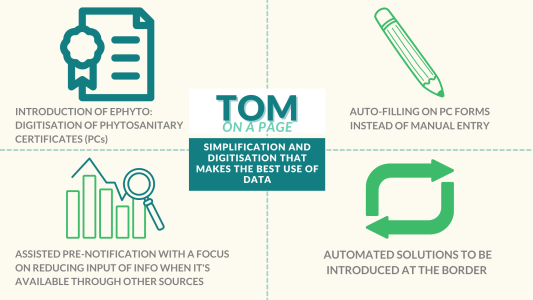Border Target Operating Model - Round Up of Information and Documents
The UK government has published the draft Border Target Operating Model, also known as the TOM, which sets out a world-leading model for the import of goods, including plants and plant products.
When the UK left the EU, Defra became responsible for creating the new biosecurity controls for plants and plant products. The new model began with risk-based checks being introduced on high-priority plants and plant products, together with the requirement to obtain a Phytosanitary Certificate before importing these goods, since they pose the greatest risk to UK biosecurity. The TOM continues the phased approach of biosecurity controls to the import regime of plants and plant products.
The TOM has been published as a draft, and we as government are requesting your feedback on the proposals before they are finalised. This engagement period will last for 6 weeks, and Defra will run a programme of plant-specific engagements. The final TOM is due to be published later in the spring.
Here is an overview of the Plant Health proposals:
A global, risk-based, targeted approaches to official border controls:
- A new harmonised regime for all EU and non-EU countries, and flat rate fees which were introduced in July 2022
- Commodities will be categorised by risk into high, medium or low, and the risk-levels will be updated using real-time data on what is being found at the border
- The lowest risk goods, which include some fruit, vegetables and cut flowers will be exempt from controls at the border and will not require a phytosanitary certificate (PC) or pre-notification.
- Alternatively, low risk goods will be subject to enhanced inland monitoring at other parts of the supply chain to monitor the risk levels of these goods and adapt if necessary

Simplification and digitisation that makes the best use of data:
- Digitised PCs or ePhytos will be phased in, starting with those countries that GB has the highest volume of trade with
- Through ePhyto there will be a cloning feature that will reduce the manual entry of information that may help your business save time
- Assisted pre-notification features such as bulk upload of commodities, cloning and use of an API will reduce the input of information when it is readily available through other trusted sources.

Trader assurance schemes that allow facilitations:
- Authorised Operator Status is being explored for plants and plant product imports, enabling traders to manage their own SPS risks
- The authorisation proposal will delegate responsibility to ‘Authorised Operators’ to carry out physical and identity checks on their own imports, provided they complete training, demonstrate their competence, and designate their premises as a Control Point
- ‘Authorised Operators’ will be subject to robust and regular audits

Key dates for the continued phased approach of biosecurity controls:
- From October 2023, all imports of medium-risk plants and plant products (including those imports from the EU) will need to have a phytosanitary certificate upon entry.
- From January 2024, high-risk plants and plant products must come through a Border Control Post (BCP) or Control Point (CP) where identity and physical checks will be carried out. Checks will no longer take place at Points of Destination (PoDs).
- From January 2024, documentary checks and physical and identity checks at the border will be introduced for medium-risk goods imported from the EU. In line with the reduced frequency of checks, checks will have a baseline of 3% for EU imports and 5% for non-EU imports, but may be different in specific cases, where additional risk factors apply.
- From January 2024, low-risk goods will be exempt from systematic controls at the border and so will not require a phytosanitary certificate or pre-notification. This includes most fruit, vegetables and cut flowers. Instead, they will be subject to enhanced inland monitoring via surveillance at the most appropriate locations and times, and evidence-led visits to premises by plant health inspectors.
Next steps:
- Find out more information on the TOM plant health proposals
- Read the draft TOM and submit feedback
- Sign up to a ministerial all stakeholder call with Lord Benyon and a sector specific online session to find out how the TOM proposals affects your business
Related advice in Post Brexit Border Strategy
- Update on Appendix 5A changes to SPS (Sanitary & Phytosanitary) document codes for compatibility with CERTEX validation
- Reminder - NI Movement Assistance Scheme closes on 30th June 2025
- Common Agreement Updated Presentation June 2025
- The Marking of Retail Goods Regulations 2025 - Not for EU Labelling
- Windsor Framework Phase 3: Products that need individual product labels from 1 July 2025
- If your business moves goods from Great Britain to Northern Ireland (GB to NI) by parcels or freight – Windsor Framework update for 1 May 2025